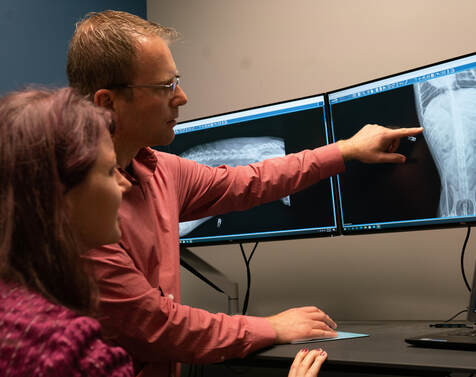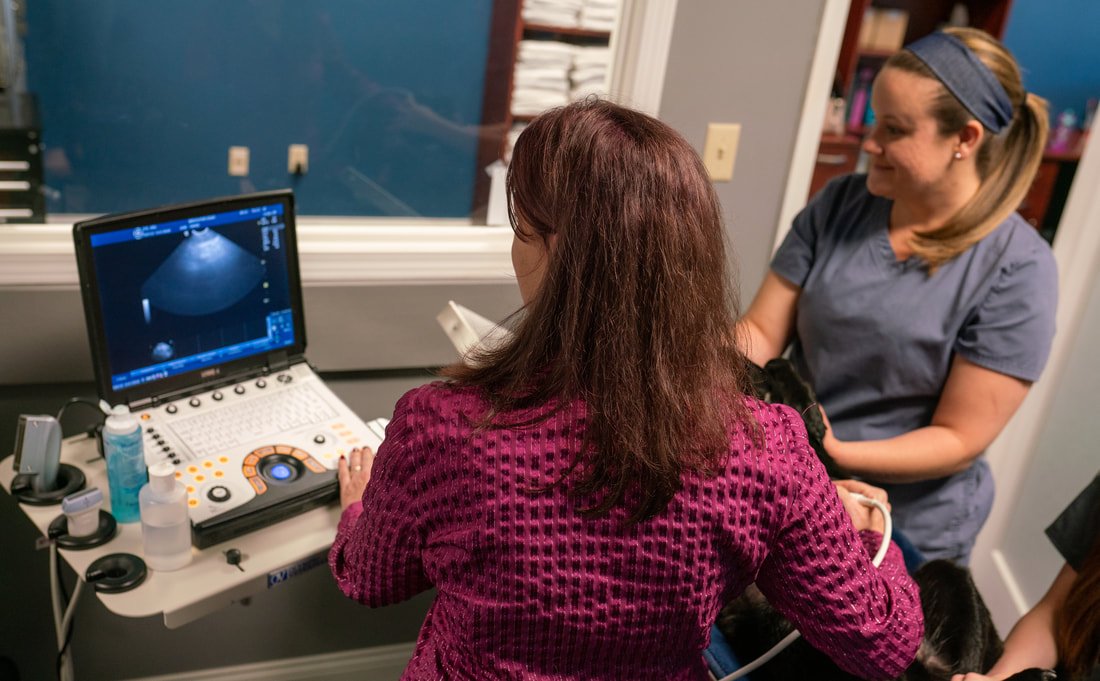Preparing for your ultrasound exam
6 The following information is provided to help facilitate your pet's ultrasound exam and to ensure the safety of you, your pet, and our staff.
FAQ Virtual Tour
1. Please fast your pet before the exam. Fasting improves visualization of the abdominal structures and is necessary if
sedation is required (Regardless of anatomical exam location). Water is fine to provide, however food should be withheld the
morning of the appointment if possible. No food, treats, snacks, grass, dental chews, after midnight, the night before your exam.
Please pick up any food that would be normally left out over night, if your patient (or other pets in the home) are free feed.
You may feed a small amount of wet food if needed in order to administer medications.
If you have a very small, young puppy/kitten, or severely debilitated pet, diabetic patient, or if referring veterinarian recommends against fasting for a
medical condition you may feed a small meal of wet food up 2 hours prior to the ultrasound or ask your veterinarian for specific instructions.
Rabbits, Guinea Pigs and other small mammals DO NOT need to be fasted.
2. PLEASE bring a list of CURRENT MEDICATIONS.
In many cases these medications do not interfere with the exam or sedatives that might be needed, but there are a few exceptions.
1) Pepto bismol or sucralfate/carafate - these should be withheld the day of the exam. They can prevent visualization of some abdominal structures.
2) Tramadol or Fluoxetine (Prozac) - these should be withheld the day of the exam. They can interfere with sedation if needed.
IF YOU HAVE ANY CONCERNS ABOUT YOUR PATIENTS CURRENT MEDICATIONS AND IF THEY SHOULD BE GIVEN OR NOT- PLEASE CONTACT THE OFFICE BEFORE YOUR EXAM and we can discuss your patients specific medications.
MAST CELL PATIENTS - if your patient is being seen for possible mast cell disease spread/ultrasound prior to chemo/oncology treatment PLEASE READ.
3) BENADRYL (Diphenhydramine) - This medication if recommend prior to obtaining aspirates of masses or other tissues. We have this medication
on site in an injectable form. But it can also be given orally 1-2 hours prior to your exam (contact referring veterinarian for specific dosages for your
patient). Oral over the counter diphenhydramine is cheaper than injectable.
3. Please allow your pet to urinate and defecate prior to traveling to our practice for your appointment. Do not
allow your pet to urinate once arriving. A semi filled bladder is preferred for the examination. If we feel that
your pet is uncomfortable due to a full bladder we will pause the exam to take them outside to urinate.
4. Our lobby is open, (Masks are optional) so you can wait inside and enjoy a hot beverage or water while your pet is in
with the doctor for their exam. Come on in the lobby and let the receptionist/tech know you have arrived.
We also can come get your pet, while you wait in the car if curbside is preferred (Please call
636-220-4155 to check in.) For the safety of your pet, please have a leash or carrier at all times.
If your patient doesn't prefer the company of other animals, our lobby is small, please call us and we will come to your car.
5. Being on time for your appointment will help limit contact with other clients and will allow us to dedicate the entire appointment
time to your pet. If you are late, we may have to reschedule your exam. Appointments will last approximately 30 minutes.
6. Shaving the hair over the area being imaged is necessary for visualization.
7. After the examination, the technician will return your pet to you/ your vehicle and take your form of payment. The
radiologist go over your pet's exam findings.
8. Ultrasound cost will be $465.00 , which includes consultation with the radiologist. Additional diagnostics may be performed at
additional cost with your consent.
9. If you need to cancel your appointment, please let us know immediately. We request at least 24 hours notice to cancel appointments, and all missed appointments WILL be billed a CANCELLATION FEE - $90.
FAQ Virtual Tour
1. Please fast your pet before the exam. Fasting improves visualization of the abdominal structures and is necessary if
sedation is required (Regardless of anatomical exam location). Water is fine to provide, however food should be withheld the
morning of the appointment if possible. No food, treats, snacks, grass, dental chews, after midnight, the night before your exam.
Please pick up any food that would be normally left out over night, if your patient (or other pets in the home) are free feed.
You may feed a small amount of wet food if needed in order to administer medications.
If you have a very small, young puppy/kitten, or severely debilitated pet, diabetic patient, or if referring veterinarian recommends against fasting for a
medical condition you may feed a small meal of wet food up 2 hours prior to the ultrasound or ask your veterinarian for specific instructions.
Rabbits, Guinea Pigs and other small mammals DO NOT need to be fasted.
2. PLEASE bring a list of CURRENT MEDICATIONS.
In many cases these medications do not interfere with the exam or sedatives that might be needed, but there are a few exceptions.
1) Pepto bismol or sucralfate/carafate - these should be withheld the day of the exam. They can prevent visualization of some abdominal structures.
2) Tramadol or Fluoxetine (Prozac) - these should be withheld the day of the exam. They can interfere with sedation if needed.
IF YOU HAVE ANY CONCERNS ABOUT YOUR PATIENTS CURRENT MEDICATIONS AND IF THEY SHOULD BE GIVEN OR NOT- PLEASE CONTACT THE OFFICE BEFORE YOUR EXAM and we can discuss your patients specific medications.
MAST CELL PATIENTS - if your patient is being seen for possible mast cell disease spread/ultrasound prior to chemo/oncology treatment PLEASE READ.
3) BENADRYL (Diphenhydramine) - This medication if recommend prior to obtaining aspirates of masses or other tissues. We have this medication
on site in an injectable form. But it can also be given orally 1-2 hours prior to your exam (contact referring veterinarian for specific dosages for your
patient). Oral over the counter diphenhydramine is cheaper than injectable.
3. Please allow your pet to urinate and defecate prior to traveling to our practice for your appointment. Do not
allow your pet to urinate once arriving. A semi filled bladder is preferred for the examination. If we feel that
your pet is uncomfortable due to a full bladder we will pause the exam to take them outside to urinate.
4. Our lobby is open, (Masks are optional) so you can wait inside and enjoy a hot beverage or water while your pet is in
with the doctor for their exam. Come on in the lobby and let the receptionist/tech know you have arrived.
We also can come get your pet, while you wait in the car if curbside is preferred (Please call
636-220-4155 to check in.) For the safety of your pet, please have a leash or carrier at all times.
If your patient doesn't prefer the company of other animals, our lobby is small, please call us and we will come to your car.
5. Being on time for your appointment will help limit contact with other clients and will allow us to dedicate the entire appointment
time to your pet. If you are late, we may have to reschedule your exam. Appointments will last approximately 30 minutes.
6. Shaving the hair over the area being imaged is necessary for visualization.
7. After the examination, the technician will return your pet to you/ your vehicle and take your form of payment. The
radiologist go over your pet's exam findings.
8. Ultrasound cost will be $465.00 , which includes consultation with the radiologist. Additional diagnostics may be performed at
additional cost with your consent.
9. If you need to cancel your appointment, please let us know immediately. We request at least 24 hours notice to cancel appointments, and all missed appointments WILL be billed a CANCELLATION FEE - $90.

